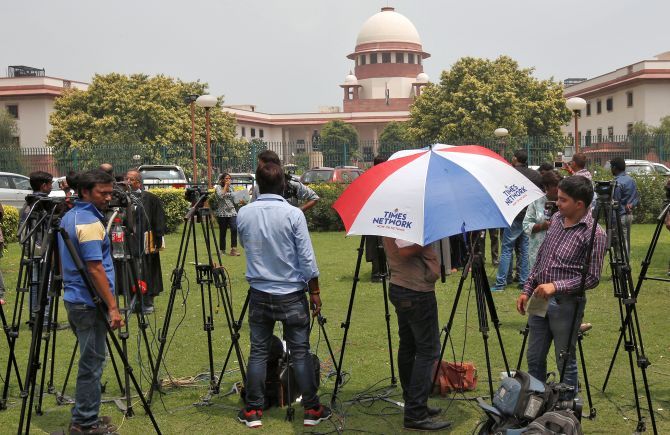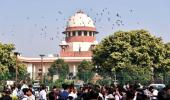The Supreme Court Monday said the Centre was testing its "patience" and "emasculating" tribunals by not appointing officials to the quasi-judicial bodies which are facing severe crunch of presiding officers as well as judicial and technical members and sought action on the matter by September 13.

Asserting that it did not want any confrontation with the government, a special bench headed by Chief Justice N V Ramana asked the Centre to make some appointments to the tribunals before next Monday.
There are around 250 posts lying vacant at various key tribunals and appellate tribunals such as NCLT, DRT, TDSAT andT.
"You are emasculating the tribunals by not making the appointments," said the bench, also comprising Justices D Y Chandrachud and L Nageswara Rao.
Solicitor General Tushar Mehta requested the bench to adjourn hearing due to non-availability of Attorney General K K Venugopal due to personal issues.
"No, sorry. Last time, we had made it very clear. We have set up this special bench of two senior judges by disturbing two regular benches. They had earlier heard these matters and passed detailed judgements," the CJI said.
"There is no respect for the judgements of this court. This is what we are feeling. You are testing our patience. Last time, you made a statement that some persons have been appointed. Where are they appointed," he said.
Mehta said these appointments were made in Central Administrative Tribunals and shared information from the finance ministry on the new Tribunals Reforms Act and the rules to be framed under it.
"The government will ensure that within the next two weeks, a decision on appointments to all the tribunals, where the search and selection committee has already recommended names for appointments," he said.
The court took note of the submissions and adjourned the hearing on a batch of pleas pertaining to the vacancies at the tribunals and the new law for further hearing on September 13. "We hope the appointments will be made by then".
"It seems you are bent upon not respecting the judgement of the court.... We have only three options left, one is staying the legislation or whatever the Act that you have made and directing you to go ahead with the appointments, or close down these tribunals and give the powers to high courts to take up these matters, and third is we ourselves will appoint the people. We may consider initiating contempt proceedings," the CJI said.
"We do not want confrontation with the government and we are happy with the way the nine Supreme Court judges were appointed. The entire legal fraternity appreciated this.... But what about these tribunals? These are small tribunals. Some of them are very good like NGT, CAT, consumer commissions, NCLT. No chairpersons, no presidents, nothing....they are collapsing. Why are you so particular about these tribunals, we do not understand," the bench said.
Mehta said the government does not want any confrontation either.
The bench asked the Centre to apprise it of alternative proposals, if any and whether it wanted these quasi-judicial bodies.
It said some panels headed by judges had made some recommendations 18 months ago under the then existing laws to which the government cannot have any objection.
"Still, virtually no appointments were made.... Some tribunals are on the verge of closing down. Some of them are functioning with one member, they are on the verge of extinction. We can understand that there was some law which was in the offing and the Centre was saying it will make appointments according to it, but these were recommendations made strictly in accordance with the law as it existed then," the bench said.
It also referred to the severe crunch of presiding officers and other members in tribunals like AFT, NCLT and NCLAT.
"These tribunals are critical to the economy. They are the cornerstone of the government's policy for reconstruction and rehabilitation of the corporate sector. Because of the vacancies, NCLT and NCLAT cannot dispose of matters.... There is an outer limit of 330 days for completing the corporate insolvency resolution process," it said.
There is an apex court judgment which said if insolvency proceedings are not decided within the stipulated time period, then they will have to go under liquidation, it said.
Justice Chandrachud referred to the new memorandum of procedure which said that the shortlisted names will be recommended only after getting the IB (Intelligence Bureau) clearance.
He said he was once heading the selection committee for appointments in the National Consumer Disputes Redressal Commissions (NCDRC).
"As per the new MoP, you first get the IB report and then shortlist the appointments. Once you make the recommendations, there is no question of IB raising any objections. So the names which are sent by the selection committee are all IB cleared. Unless IB clears, we don't send those names because we do not want to get into a thicket," Justice Chandrachud said.
Notwithstanding that, the names recommended were deleted and there is no clarity why they are deleted and the recommendations were made by the panel to which senior officials were also part, he said, adding, "It is a waste of energy".
The bench said the apex court has to "deal with the burden" in the absence of a work force in tribunals.
"We have appeals against interlocutory orders from NCLT. Keeping in mind the outer limit, we are interfering. We are told that the tribunal could not take up these applications. We had to extend the periods otherwise the doors would have been closed...," it said.
The bench asked the Centre to set up the Central Goods and Services Tax Tribunal (CGST) as sought by lawyer Amit Sahni in his PIL.
"There is no question of filing the counter affidavit. You (Centre) have to constitute the tribunal, that's all. If you want an order, we will pass an order to the effect of whatever we have said in court. If you do not want an order, we want some appointments by the next date of hearing...," it said.
The top court also issued notices on several fresh pleas including the one filed by Congress leader Jairam Ramesh challenging the Constitutional validity of various provisions of the Tribunal Reforms Act, 2021, which was passed during the recent Monsoon Session of Parliament and received Presidential assent on August 13.
Earlier, the bench had given details of pending vacancies in 15 quasi-judicial bodies such as Debt Recovery Tribunals (DRTs) and Securities Appellate Tribunal. There are 19 vacant positions of presiding officers or the chairman in these tribunals, besides 110 and 111 posts of judicial and technical members respectively lying vacant.











 © 2025
© 2025